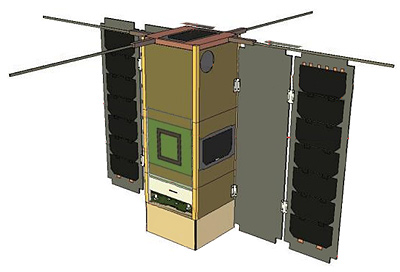IceCube (Earth 1) (original) (raw)
Please make a donation to support Gunter's Space Page.
Thank you very much for visiting Gunter's Space Page. I hope that this site is useful and informative for you.
If you appreciate the information provided on this site, please consider supporting my work by making a simple and secure donation via PayPal. Please help to run the website and keep everything free of charge. Thank you very much.

IceCube [NASA]
IceCube or Earth 1 is a 3U CubeSat mission developed by NASA's Goddard Space Flight Center to evaluate sub-mm-wave remote sensing from a CubeSat.
The objectives of the mission are:
- Develop a flight-qualified 874 GHz receiver for future cloud remote sensing
- Validate 874 GHz radiometer hardware, operation and calibration performance in space on a 3U CubeSat
- Launch 3U COTS-component CubeSat to LEO orbit with >350 km altitude
- Observations of Earth atmosphere and space for 28+ days, and data return for NEDT, calibration error, and response to clouds
The satellite is to demonstrate and space-qualify a commercially available 874 GHz submillimeter-wave receiver developed by Virginia Diodes Inc. (VDI), of Charlottesville, Virginia. This instrument is capable of providing an accurate assessment of the distribution of atmospheric ice.
It was selected in 2013 by NASA's CubeSat Launch Initiative (CSLI) to be launched as part of the ELaNa program. It was selected in 2014 by NASA as part of the Science Mission Directorate's Cubesat Initiative.
The satellite was deployed on the ELaNa-17 mission on 16 May 2017 from the ISS.
| Nation: | USA |
|---|---|
| Type / Application: | Earth sciences |
| Operator: | NASA Goddard Space Flight Center |
| Contractors: | NASA Goddard Space Flight Center |
| Equipment: | 874 GHz radiometer |
| Configuration: | CubeSat (3U) |
| Propulsion: | None |
| Power: | 2 deployable fixed solar arrays, solar cells, batteries |
| Lifetime: | 3 months (design), 1 year |
| Mass: | 4 kg ? |
| Orbit: | 401 km × 404 km, 51.64� |
| Satellite | COSPAR | Date | LS | Launch Vehicle | Remarks |
|---|---|---|---|---|---|
| IceCube (Earth 1) | 1998-067LN | 18.04.2017 | CC SLC-41 | Atlas-5(401) | with Cygnus CRS-7, ALTAIR 1, SUSat, UNSW-EC0, i-INSPIRE 2, ZA-AeroSat, nSIGHT 1, Ex-Alta 1, LilacSat 1, NJUST 1, Aoxiang 1, SOMP 2, QBITO, Aalto 2, X-CubeSat, EntrySat, SpaceCube, DUTHSat, UPSat, Hoopoe, LINK, SNUSAT 1, SNUSAT 1b, qbee50-LTU-OC, BeEagleSat, HAVELSAT, Phoenix, PolyITAN-2-SAU, QBUS 1, QBUS 2, QBUS 4, CSUNSat 1, CXBN 2, KySat 3, SHARC, Lemur-2 30, ..., 33 |